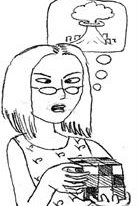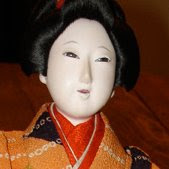I was also accused of being a cynic and not giving Brier his dues for his role as an enthusiastic ambassador to the layperson. This is what I'm going to discuss here, along with some of my thoughts on the study of history in general.
I have a bachelor's degree in computer science and in biology. As a layperson, I'm very interested in the study of history but find the tendency towards the portrayal of opinion as fact, and the seeming acceptance of this within the field is disturbing.
In a biological paper, evidence is king. You do not make an assertion unless you have hard data to back it up, and you accept that your peers are going to shred you if that evidence is flawed. I would like to see this same principle applied in historical works, but I find that even in papers not aimed at laypeople, seemingly farfetched and currently unprovable hypotheses are thrown out with minimal and circumstantial evidence to back them up. A good example of this aimed at the layperson is Joan Fletcher's "discovery" of Nefertiti's mummy. Her evidence to back this discovery was a)a fragment of hair nearby looked like it might have been styled in the style of a wig popular in the general time period of the queen. b) the mummy was damaged and in a royal tomb, and even though it had been cached there, she seemed to take this as evidence that the mummy was royalty and that it was damaged as an act of spite (appropriate to one involved in heresy, ie. Nefertiti.) and c) an arm found near the mummy was bent in the style often used with mummies of queens, (and also other royals and nobles, depending on the time period.
A paper on this would have been torn up nine-ways from Sunday, but this woman was given a TV special and allowed to present this theory to the general public...who can't be expected to know any better.
Some would say that the enthusiasm exhibited by Fletcher is a credit to Egyptology. I think she's doing more of a disservice to the field by spreading bad information. Anyone who truly becomes interested in Egyptology based on her TV special probably would have become interested by a TV special that was more substantiated. There are plenty of interesting things to say about Nefertiti without venturing into the realm of utter bullshit.
The problem with history is twofold. We can't write a history paper like a biological paper because history is determined by human emotions. To understand history, you must try to understand why people behave the way they do and the mechanisms within society that allow for it. The trouble is this: a person can never truly know how another person feels. A person explains the emotions of others by projecting their own emotions onto others, which may or may not correspond with how others actually feel. We can make educated guesses on why people act in certain ways based on textual evidence and archaeological evidence from the times in which they lived. Sadly, the further back in time we go from the present, the fewer keys we have to deducing why people did what they did, and we are left with guesswork. When you blindly guess at the emotions of others, and therefore the reasons why certain figures in power acted a certain way, you are at best telling why YOU would do something, and at worst, you're telling a fairytale. Even worse is trying to piece together the actions of ancient people based on how you think they must have felt.
Case in Point: Dr. Brier's Murder of Tutankhamun. Dr. Brier deduces that King Tut was murdered based on a fracture in the skull of his mummy, which has been thoroughly manhandled at least twice since its discovery and once during mummification. King tut was obviously smacked upside the head with a blunt object. Who did it? Brier thinks it was Ay, pretty much because he thinks Ay had something to gain from it. (Ay was an old man who was king for a very short time before he died.). Brier writes a whole book about how Tutankhamun was murdered with no actual hard evidence aside from a fracture in the boy-king's skull which could be a pre-mortem injury....and the emotions which Brier projects onto the people around Tut at the time of his death.
I feel that this trap is a lot easier to fall into in history than in the hard sciences. We're emotionally invested in these historical figures. A little bit of storytelling can make these figures more relevant and more real to modern scholars. Sometimes, it seems like scholars, especially when talking to the layperson, confuse storytelling for factual evidence, and this is very troublesome.
In conclusion, if it were up to me, I'd like to read works on history where no conclusions are made without pretty solid epigraphical or archaeological evidence to back them up. Don't know why Tut died? Then just accept the fact you don't know and keep looking for clues. Make a hypothesis and test it by finding evidence that backs it up and evidence that doesnt and fairly weighing both.
I know that this is not "neat" and not "tidy", and sometimes not as interesting, but that's why God invented historical fiction. :)


1 comment:
Hi! Interesting blog, but I can't help but feel I need to comment in defence of Brier (anyone that knows me would likely expect no less!). Firstly, you appear to be basing your opinions on one book by Brier (that about the murder of Tutankhamun). This is the same book that was produced into a TV show, correct? His theories were based on X-Rays, experiments, and ancient writings. His ideas were well thought up and were inkeeping with what is known about this period of history, so I'm not sure why there's such a problem with that. He has since admitted himself (since evidence came about to oppose his theory) that he was wrong, but that doesn't prove that it was a bad idea, or that he tends towards storytelling. You said that "Dr. Brier omits any scholarship that doesn't support his theory that Tutankhamun was murdered." Specifically, what evidence are you referring to that he omits??
I have personally never heard Bob Brier state something as fact that isn't so (he often just relates the most accepted theory to an audience; rather than stating half a dozen theories that all have possibilities of being true, that would only serve to confuse uninformed people). In fact, I have listened to lectures of his, and when he relates theories of his own, he always stresses that the following isn't necessarily accepted, but is his own idea, as a caution. These are educational lectures of his, so he can have his own say without it being cut by some TV channel.
Post a Comment